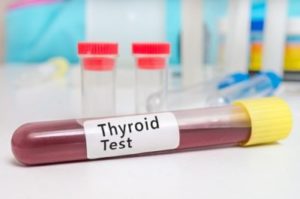9. Autoimmune polyendocrine syndrome (APS)
Autoimmune thyroid disease often does not stop at the thyroid. It indicates an immune disorder that may affect the entire body.
A 2003 article, “Update on Autoimmune Polyendocrine Syndromes (APS),” found that 52% of patients with Thyroid Autoimmune Disease could be considered affected by APS-3. [58]
APS-3 stands for Autoimmune Poly endocrine Syndrome Type 3. This is not a specific disease, but a group of autoimmune diseases that often come together. The list of auto immune diseases that are associated with hypothyroidism is extensive. However, some of the more common ones are: type 1 diabetes, celiac disease, inflammatory bowel disease, multiple sclerosis, and rheumatoid arthritis.
Treating autoimmune thyroid disease with just thyroid medications
Imagine cleaning your room, by kicking all your garbage under the bed. For a while this might work. Sure there is a mess under the bed, but you can’t see it and nothing else in your room is affected. However, the mess is still there. You didn’t clean it up. You just made it invisible.
This is what taking thyroid medication for autoimmune disease is like. It may make you feel better, but the problem causing the autoimmune disease is still there.
Getting back to the bedroom analogy, eventually you run out of space under the bed, so you open your closet and kick garbage in there.
This is like waiting for the same problem that caused the autoimmune disease to strike again and cause new symptoms. Then you can take another drug for the new symptoms.
Eventually you will run out of hidden spaces to kick the garbage. Now it’s impossible to not see the mess. And it will just get larger and larger until you do the work and get to really cleaning it up.
With autoimmune disease, eventually the problems become so big that people can’t cover up the symptoms with drugs. This may take years, or even decades to develop, but eventually the underlining problems often catch up with people.
The correct use of thyroid medications
Taking thyroid medications is sort of like cleaning up a mess by throwing things under the bed. That’s covering up a symptom, not treating the real problem.
Since standard conventional treatment for autoimmune thyroid disease is the prescription of synthetic T4 drugs, I can say that conventional medicine does not treat autoimmune thyroid disease. They do nothing to stop the autoimmune process. All they do is cover up a symptom.
If you have autoimmune thyroid disease, consider poor digestive function as a possible cause. It may be best to seek help from a qualified holistic practitioner who knows how to get to the root cause of autoimmune disease.
Likewise, it is a good idea to get tested for celiac disease or at least go on a trial, gluten free diet. If you developed hypothyroidism from a negative reaction against gluten, thyroid medications can’t cure the negative reaction to gluten. You therefore want to get off gluten before it causes more damage to other systems of your body.
There are many benefits from this truly holistic approach to treating autoimmune thyroid disease: prevention of other autoimmune disease, the chance of not having to be on thyroid medications for life, avoiding future medical costs and improved health and well being since almost anything done naturally for autoimmune disease can only improve health and vitality.




